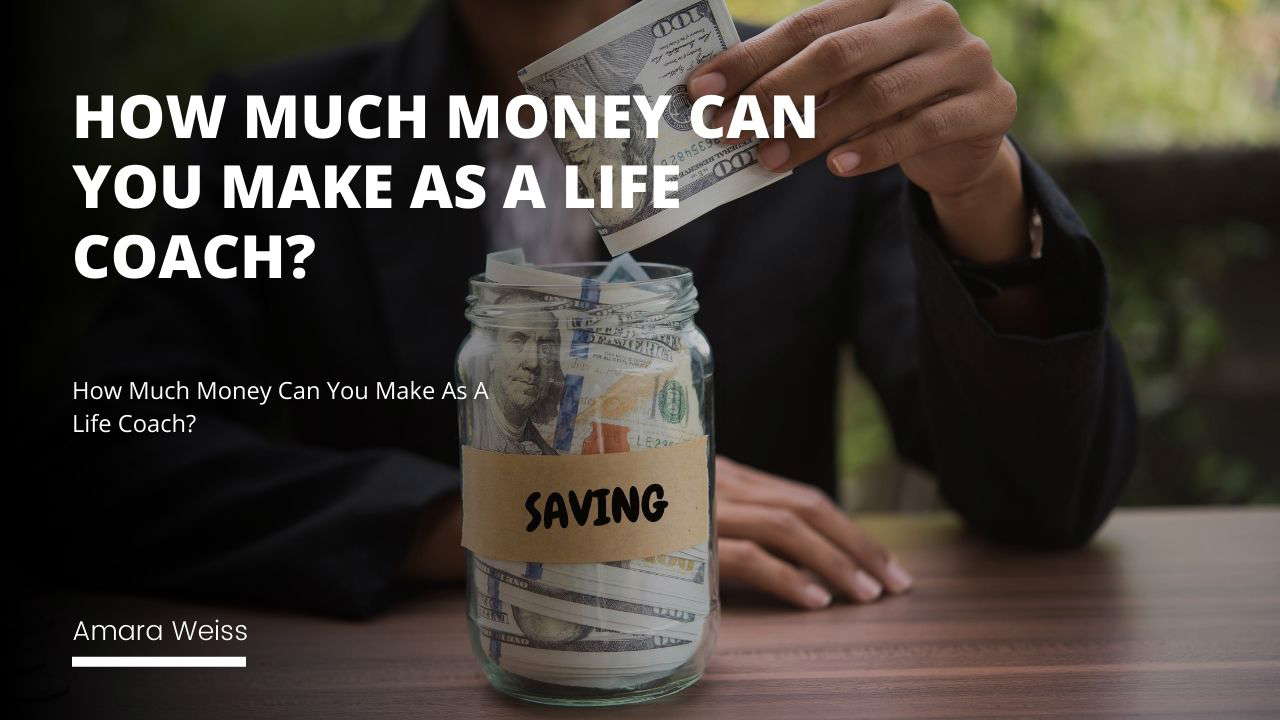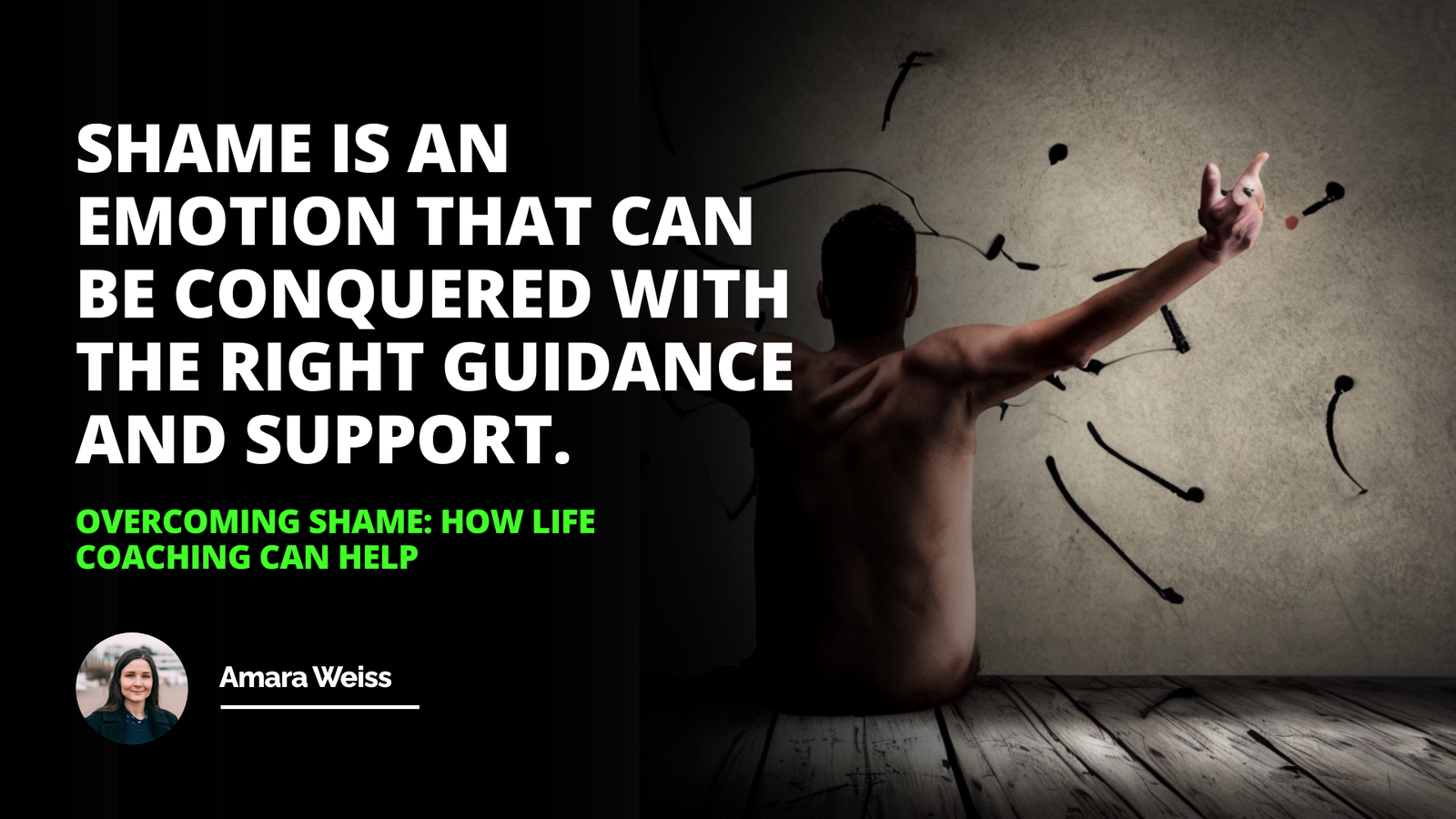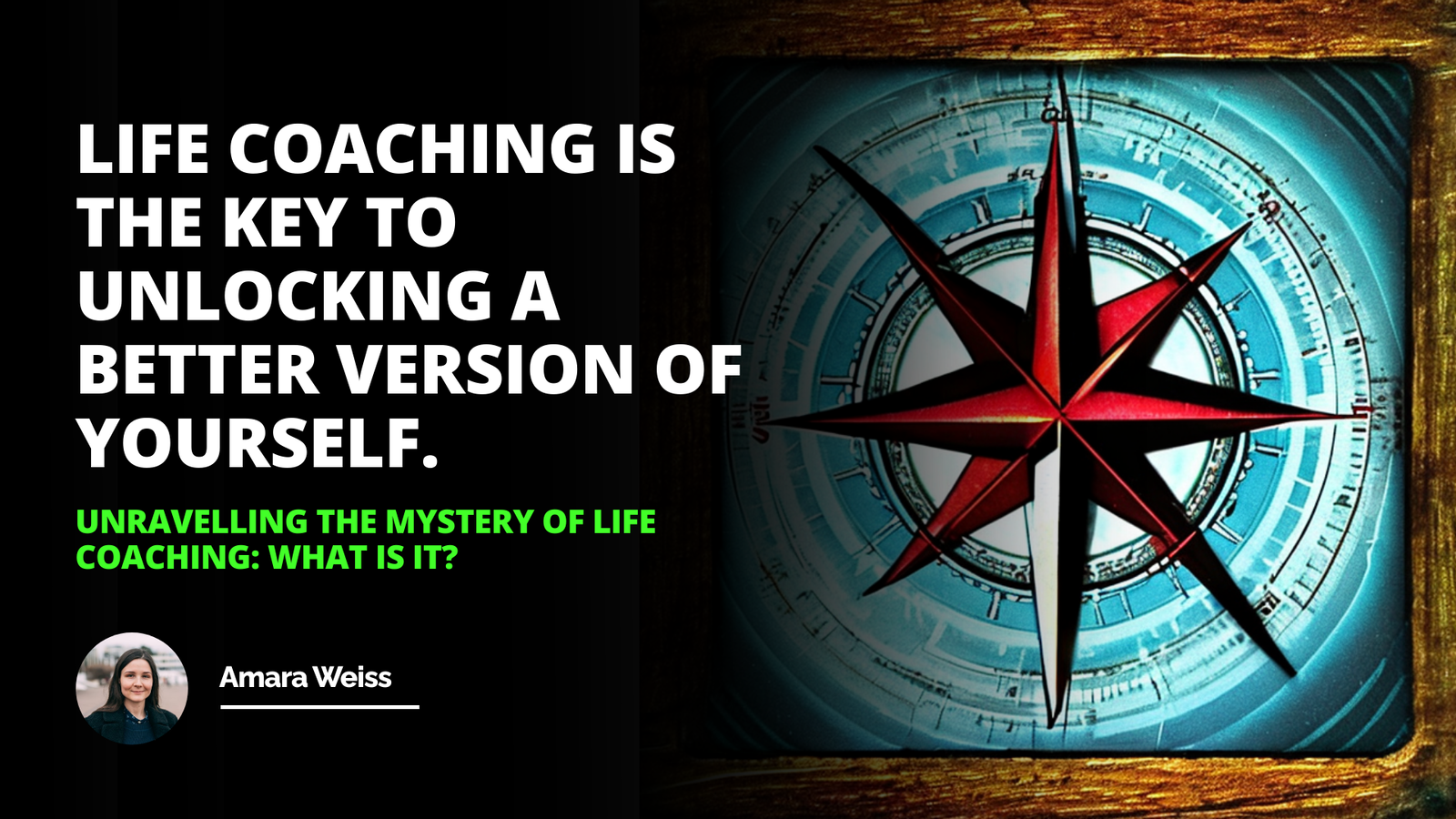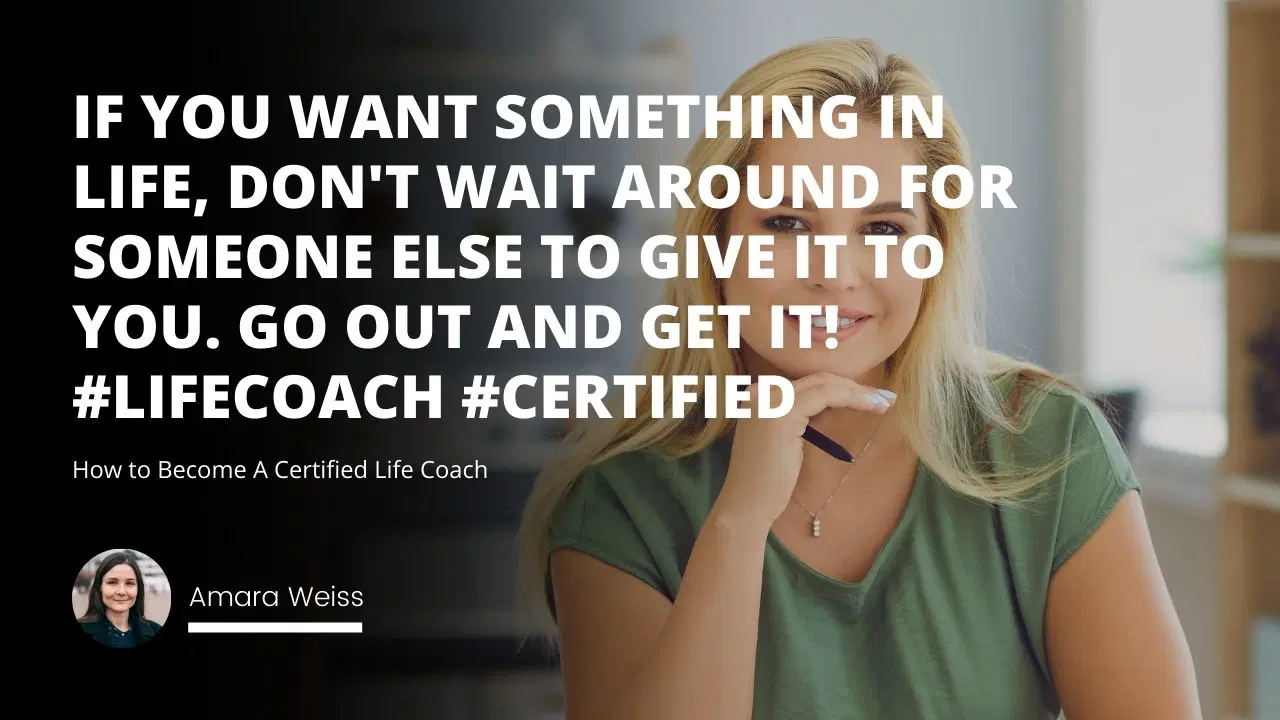
Are you looking for a way to help others improve their lives? Are you interested in becoming a certified life coach? If so, this blog post is for you! This post will discuss what it takes to become a certified life coach and the benefits of doing so. We will also provide a few tips on how to get started. So, whether you are just beginning or are considering making a career change, keep reading for helpful information on becoming a certified life coach.
The complete guide to becoming a certified life coach
A life coach is a professional who helps people identify and achieve personal and professional goals. Life coaching is a relatively new field, but it has grown in popularity in recent years. Several different organizations offer life coach certification, but the most important thing for prospective coaches is whether they have the necessary skills and personality traits to succeed in this role.
The first step to becoming a certified life coach is to complete a life coaching course. During your training, you will learn the skills and knowledge necessary to help others achieve their goals. After completing your education, you will need to take an exam to obtain your certification. The exam is designed to test your knowledge of the life coaching process and ensure that you are prepared to help others achieve success. Once you have passed the exam, you will be able to use your skills and training to help others achieve their goals and improve their lives.
The most important trait for a successful life coach is communicating with clients effectively. Coaches must be able to listen attentively and ask the right questions to help their clients identify their goals. They must also be able to provide support and motivation while helping their clients stay on track. If you have strong communication skills and are passionate about helping others achieve their goals, then a career as a life coach may be.
What is a life coach, and what do they do?
A certified life coach is a professional who helps people identify and achieve personal and professional goals. Life coaches work with clients to help them overcome challenges, set and reach goals, and make lasting changes in their lives. In addition to goal-setting and problem-solving, life coaches may also provide support and guidance on relationships, career transitions, health and wellness, and personal growth. While life coaching is not therapy or counseling, it can be an effective tool for those seeking to make positive changes in their lives. Certified life coaches are trained to listen attentively, ask probing questions, and offer constructive feedback. If you feel stuck in a rut or are seeking direction in your life, working with a certified life coach may be the right step.
The benefits of becoming a certified life coach
A career as a certified life coach can be gratifying. As a life coach, you will have the opportunity to help people make positive changes in their lives. You will work with clients to help them set and achieve goals, overcome obstacles, and make positive strides in their personal and professional lives. In addition, you will gain a great deal of satisfaction from seeing your clients succeed. So, if you are looking for a career that is both meaningful and challenging, becoming a certified life coach may be the perfect choice for you.
How to become a certified life coach
A career as a life coach can be gratifying. It offers the opportunity to help others transform their lives and reach their full potential. If you're thinking of becoming a life coach, the first step is to get certified. Fortunately, many different programs are available that can help you earn your certification. The key is to find an accredited program that offers a curriculum that suits your needs. Once you've found a program, the next step is to complete the required coursework and pass the exams. Then, with hard work and dedication, you can become a certified life coach and begin your career helping others achieve their goals.
What to expect during the certification process
The life coaching certification process gives you the skills and knowledge you need to be a successful life coach. The first step is to complete an accredited life coaching program. This will provide you with the foundation you need to understand the life coaching process and how to best help your clients. Once you have completed a life coaching program, you will need to pass a written exam and an oral exam. These exams are designed to test your life coaching theory and practice knowledge. Once you have passed these exams, you will be officially certified as a life coach.
After you become a certified life coach
Once you have earned your certification, you will be able to start your life coaching practice or join an existing one. You will also be able to work with clients in various settings, such as schools, businesses, and community organizations. In addition, you may also choose to pursue advanced training in life coaching, such as a master's or doctorate. You can build a successful career as a certified life coach with hard work and dedication.
A certified life coach can be immensely rewarding. As a life coach, you will have the opportunity to help people make positive changes in their lives. You will work with clients to help them set and achieve goals, overcome obstacles, and make positive strides in their personal and professional lives. In addition, you will gain a great deal of satisfaction from seeing your clients succeed. If you are looking for a meaningful and challenging career, becoming a certified life coach may be the perfect choice for you.
The benefits of becoming a certified life coach
A career as a certified life coach can be gratifying. It offers the opportunity to help others transform their lives and reach their full potential. If you're thinking of becoming a life coach, the first step is to get certified. Fortunately, many different programs are available that can help you earn your certification. The key is to find an accredited program that offers a curriculum that suits your needs. Once you've found a program, the next step is to complete the required coursework and pass the exams. Then, with hard work and dedication, you can become a certified life coach and begin your career helping others achieve their goals.
How much does a life coach make?
Life coaching is a growing industry with coaches working in various settings, from small private practices to large corporations. The average life coach makes $61,000 a year, but salaries can range from $30,000 to $150,000 a year, depending on experience and clientele. Coaches who are life coaching certified tend to make more than those not permitted. In addition, life coaches who work with high-profile clients or have years of experience can earn significantly more than those just starting. Many factors impact how much a life coach makes, but the potential earnings are undoubtedly high in this growing field.
Becoming a certified life coach is the first step to starting your own coaching business. If you're interested in becoming a life coach, our online course can help you get started. The course covers everything from the basics of life coaching to how to start and run your practice. With this certification under your belt, you'll be ready to start helping people achieve their goals and live their best lives. Willing to take the plunge? Enroll in our life coaching course today!
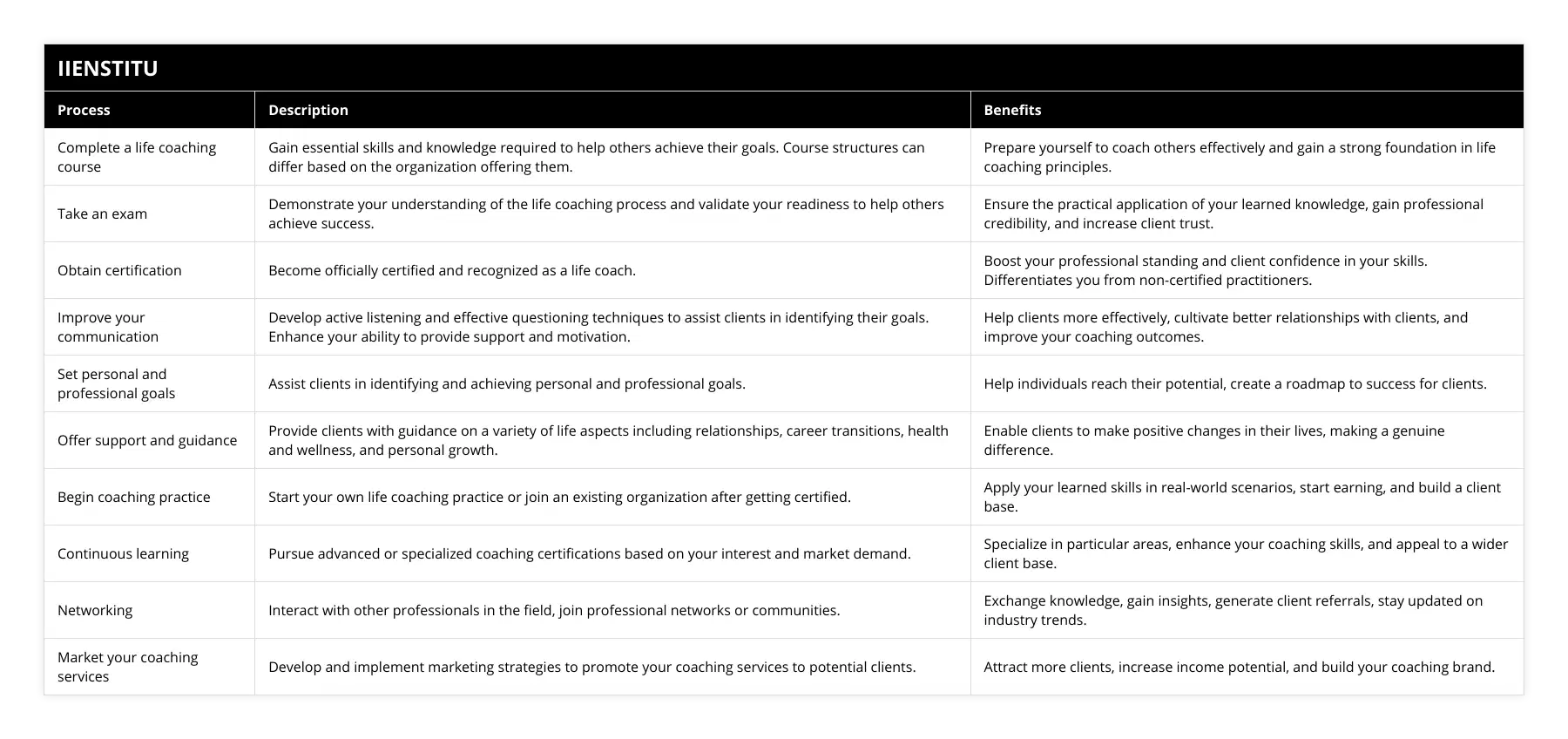
Frequently Asked Questions
What are the steps necessary to become a certified life coach?
Before becoming a certified life coach, it's essential to do your research and understand what this profession entails. Life coaching is a process that helps people identify and achieve personal and professional goals. As a life coach, you will help your clients set realistic goals and create actionable plans to reach those targets. Life coaches may use assessments, journaling, and brainstorming when working with clients.
The first step in becoming a certified life coach is completing an accredited training program. Once you have completed an accredited training program, the next step is to earn your professional certification. After you have made your certification, you will need to obtain liability insurance and set up a business structure for your coaching practice. The final step is to market your business and begin working with clients.
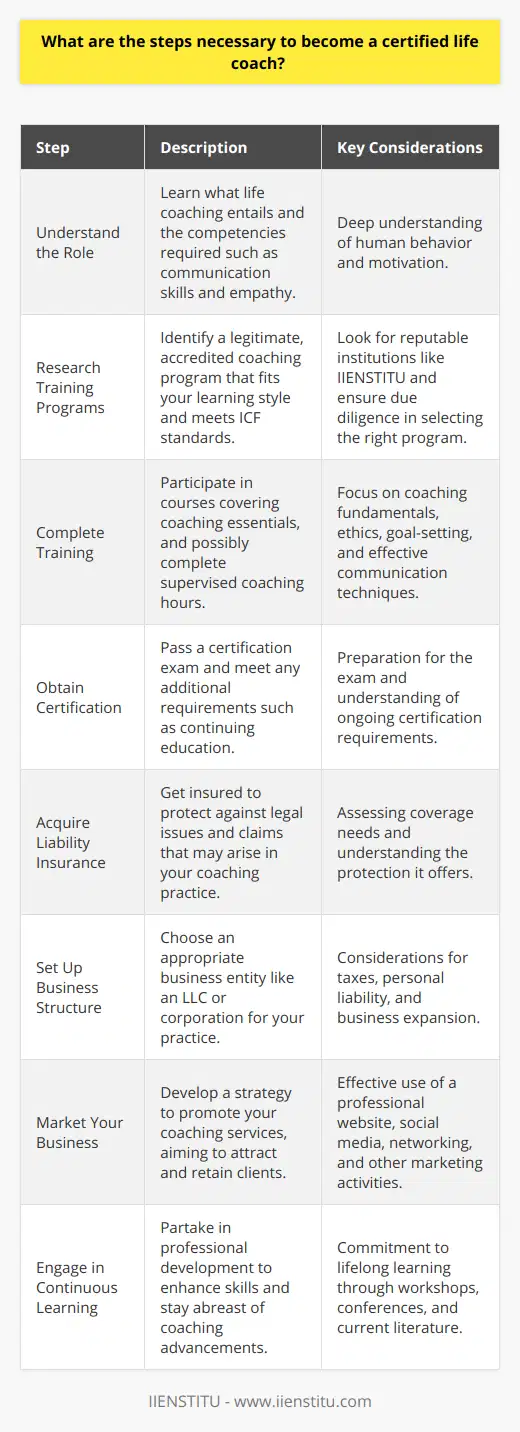
What are the benefits of becoming a certified life coach?
The benefits of becoming a certified life coach include the ability to help others achieve their goals, the satisfaction of seeing your clients succeed, and the potential to earn a high income. Certified life coaches also have the opportunity to work in various settings, from small private practices to large corporations. In addition, certified life coaches can specialize in career coaching, relationship coaching, or health and wellness coaching.
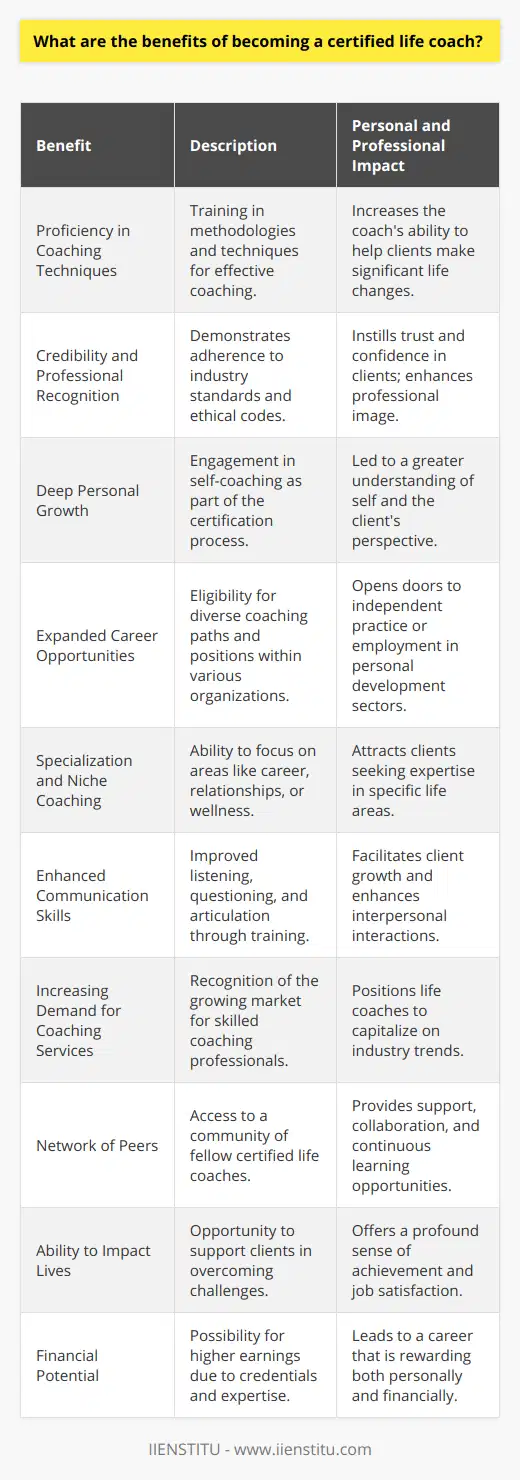
What is the average salary for a life coach?
The average salary for a life coach is $61,000 a year. However, salaries can range from $30,000 to $150,000 a year, depending on experience and clientele. Coaches who are life coaching certified tend to make more than those not permitted. In addition, life coaches who work with high-profile clients or have years of experience can earn significantly more than those just starting. Many factors impact how much a life coach makes, but the potential earnings are undoubtedly high in this growing field.
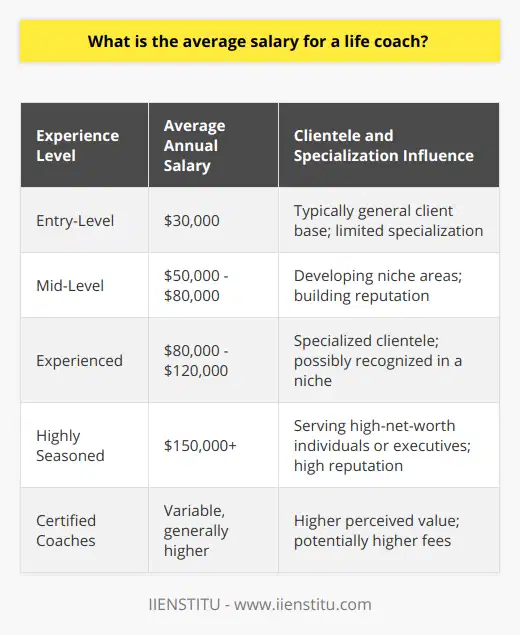
What qualifications do I need to be a life coach?
Life Coach Qualifications Overview
To become a life coach, potential candidates must possess specific qualifications and attributes to ensure a successful practice. This academic paragraph outlines the main qualifications an individual needs to be a life coach.
Certification and Training
Although not legally mandatory, obtaining a certification from a recognized coaching organization is strongly recommended. Reputable organizations, such as the International Coach Federation, offer accredited training programs and certifications which will bestow credibility and professionalism to a life coach.
Education and Background
A bachelor's degree is not required but having one, especially in psychology, counseling, or a related field, can benefit the life coach's knowledge and skill set. Moreover, possessing professional experience in a relevant area such as human resources, management, or consulting can further enhance credibility and coaching effectiveness.
Skills and Attributes
Essential skills for a life coach include effective communication, active listening, and the ability to build rapport with clients. A successful life coach must be empathetic, understanding, and non-judgmental while guiding clients towards personal and professional growth. Additionally, a life coach must possess excellent problem-solving and analytical skills to help clients identify and overcome challenges.
Continuous Development
Staying updated on the latest coaching techniques, industry trends, and best practices is crucial. Life coaches should engage in continuous professional development through workshops, conferences, and reading industry-related publications to maintain and improve their skills and knowledge.
Networking and Business Acumen
Building a successful life coaching practice requires networking and business acumen. Aspiring life coaches should strive to establish connections with other coaching professionals, attend industry events, and invest in marketing and business development resources to grow their practice.
In conclusion, qualifications for becoming a life coach encompass certification, relevant education and experience, essential skills and attributes, continuous development, and an aptitude for networking and business development. While not all qualifications are required, a combination of these elements will ensure the likelihood of a successful life coaching career.
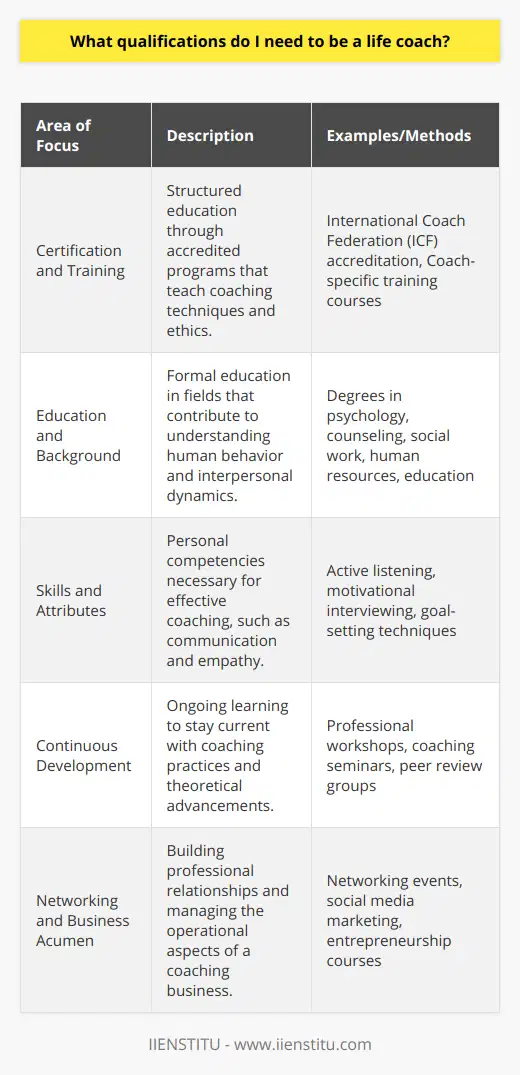
Is it worth getting life coach certification?
Importance of Life Coach Certification
Life coach certification has gained considerable attention in recent years, prompting the question: is it worth pursuing? This paragraph will examine different aspects of life coach certification, including credibility, networking opportunities, and continuous professional development.
Credibility Enhancement
First and foremost, obtaining a life coach certification serves as a testament to your skills and qualifications. It helps in establishing your professional credibility, which is essential in attracting clients and building trust. Prospective clients are likely to prefer a certified life coach over a non-certified one, as certifications indicate a higher level of competence and adherence to industry standards.
Networking Opportunities
Life coaching is a networking-driven profession. Pursuing life coach certification can unlock various opportunities to network with other professionals in the field. Many certification programs include a membership component, allowing you to network with fellow coaches and share experiences, resources, and referrals. This connection can prove invaluable in expanding your professional circle and client base.
Continuous Professional Development
Life coach certification programs typically focus on a combination of practical skills and theoretical knowledge, providing a strong foundation for your practice. These programs foster continuous professional development by offering advanced training, workshops, and access to the latest industry trends and research. By engaging with a certification program, you demonstrate your commitment to lifelong learning and continuously improving your skills and expertise as a life coach.
Accountability and Ethical Standards
Certification programs often establish clear ethical guidelines for coaches to follow. Adherence to these guidelines not only ensures that you conduct your practice with professionalism and integrity but also helps boost your reputation in the industry. By adhering to these ethical standards, you convey your dedication to upholding the highest standards of life coaching practice, further enhancing your credibility with clients.
In conclusion, obtaining life coach certification is a worthwhile investment for aspiring coaches, as it enhances credibility, expands networking opportunities, fosters continuous professional development, and promotes adherence to ethical standards. These factors ultimately contribute to a thriving life coaching practice, making life coach certification an essential aspect of the profession.
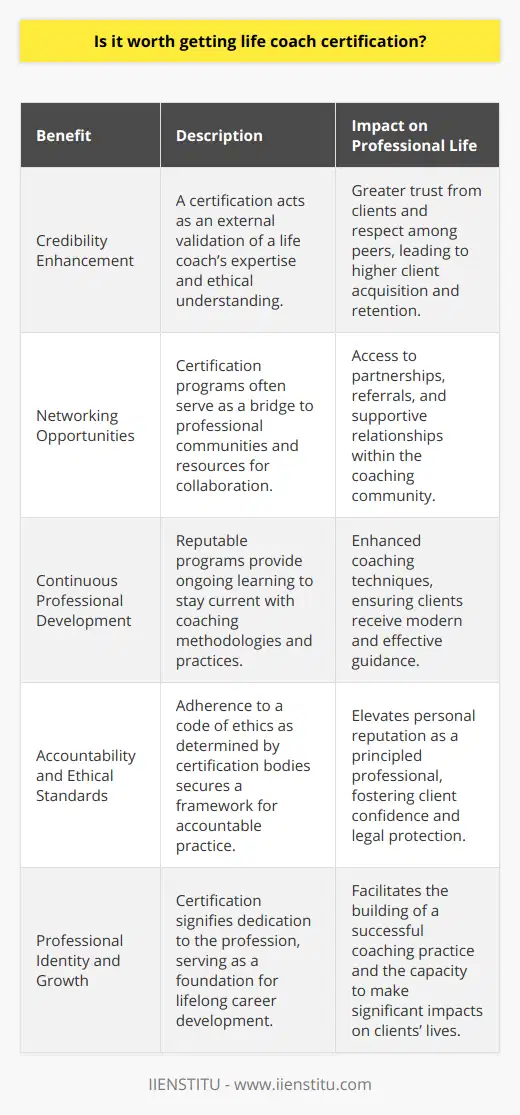
How long is life coach certification?
Duration of Life Coach Certification
Acquiring a life coach certification typically involves a combination of coursework, practical experience, and examinations. The duration of this process varies depending on the specific program and the individual's level of commitment.
Coursework and Study Time
Life coach certification programs generally consist of 30 to 125 hours of classroom instruction, which can be completed in-person, online, or a combination of both. These classes may take several weeks to several months to complete, depending on the schedule and pace selected by the participant.
Practical Experience Requirements
In addition to the coursework, aspiring life coaches must also fulfill practical experience requirements, which can range from 50 to 100 hours. This hands-on experience often involves coaching clients, peer coaching, or participation in mentor coaching sessions. The time commitment for this component depends on the individual's availability and willingness to engage with clients.
Examinations and Assessments
Once coursework and practical experience are complete, a prospective life coach will need to pass one or more examinations to attain certification. These assessments may include written exams, recorded coaching sessions, and oral evaluations. The amount of preparation and study time required for these tests will vary depending on the individual's background and the specific certification program requirements.
In Summary
Overall, the process of obtaining a life coach certification can take anywhere from a few months to over a year, depending on the chosen program, the person's dedication to completing the coursework and practical experience, and their test preparation time. Prospective life coaches should thoroughly research certification programs and consider their personal circumstances, goals, and time constraints when determining the most suitable pathway toward achieving certification.
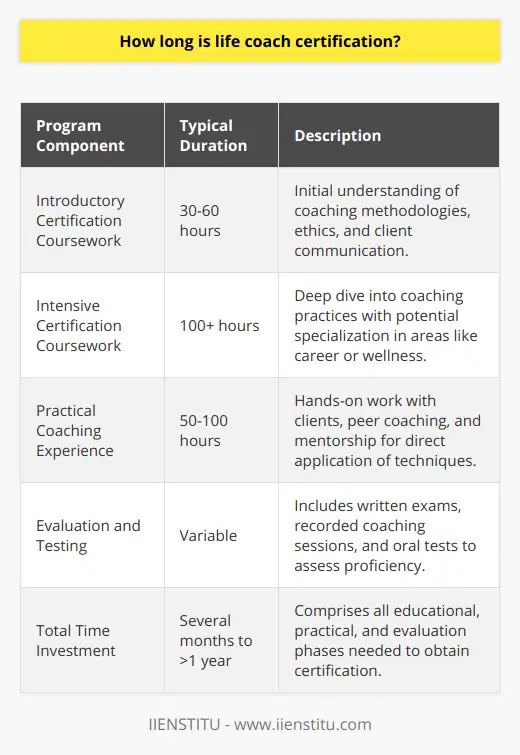
How does a life coach make money?
Income Generation Strategies
A life coach generates income through various strategies, such as providing coaching services, creating and selling digital products, and conducting workshops and trainings. The primary source of a life coach's earnings comes from offering personalized coaching sessions to clients, typically billed on an hourly or package basis.
Fee Structures and Packages
These coaching sessions can range anywhere from $50 to $500 per hour, depending on the coach's expertise and client demand. Many life coaches offer package deals, such as a predetermined number of sessions for a set price, to encourage clients to commit to a longer-term relationship. This pricing model allows life coaches to generate consistent revenue by working with a select number of clients over an extended period.
Workshops, Seminars, and Trainings
In addition to one-on-one coaching, life coaches can supplement their income by delivering workshops, seminars, and training programs. These events offer clients the opportunity to learn and practice new skills in a group setting, widening the coach's reach and maximizing their earning potential. Life coaches may charge a flat fee for group services, though some coaches may opt for a per-attendee rate.
Digital Products and Online Courses
Life coaches also capitalize on the popularity of digital products and online courses, which enable them to reach a larger customer base beyond their geographic location. By selling access to pre-recorded videos, webinars, e-books, or paid membership sites, life coaches can monetize their knowledge and experience continually. This passive income stream allows coaches to generate revenue while focusing on serving their existing clients or developing new services.
Affiliate Marketing and Referral Programs
Another income generation method for life coaches involves participating in affiliate marketing and referral programs. A life coach can partner with other like-minded businesses that offer complementary products or services and earn a commission by promoting these offerings to their clients. This approach not only increases the coach's earnings but also helps to build professional relationships and expand their network.
In conclusion, life coaches make money through a combination of coaching services, workshops, digital products, and affiliate marketing. By diversifying their income streams and staying current with market trends, life coaches can secure financial stability while empowering others to live fulfilled lives.
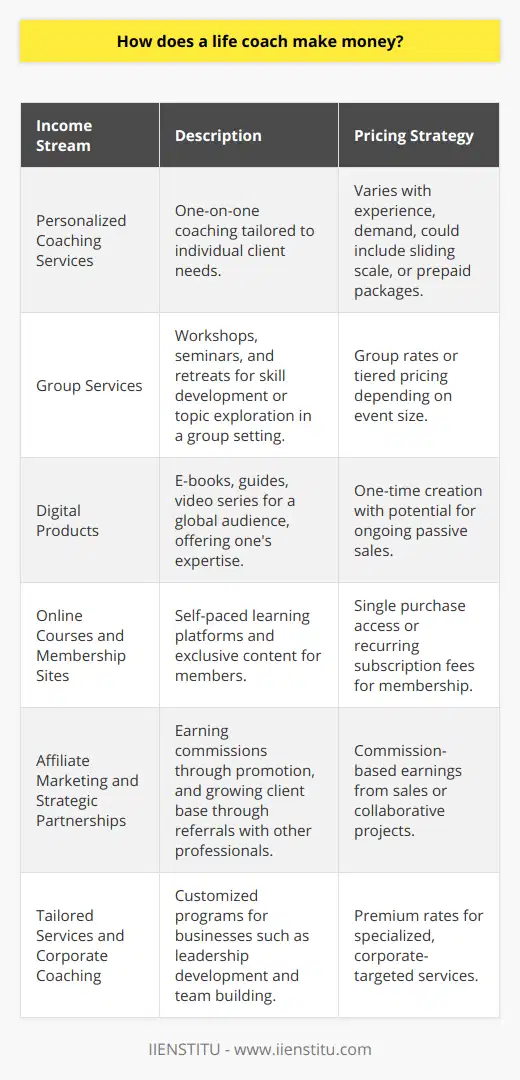
What are the primary methods for attracting and retaining clients as a life coach?
Methods of Attraction for Life Coaches
The primary methods for attracting clients as a life coach center around effective marketing and establishing professional credibility. Life coaches can use both online and offline channels to advertise their services and reach their target audience. Online channels include utilizing social media platforms, email marketing, and a professional website that showcases client testimonials, credentials, and specialized services offered. Offline channels involve networking events, public speaking engagements, and partnership with organizations that share the same target clientele.
Building Credibility and Trust
A life coach's credibility is paramount in the competitive marketplace. To enhance credibility and establish trust, life coaches can seek relevant certifications and accreditations from recognized institutions. Additionally, life coaches should regularly engage in professional development activities and stay updated with industry trends, thus ensuring their knowledge and skills are current. In turn, they can confidently showcase their expertise to potential clients, fostering a perception of trustworthiness and competence.
Providing Quality Service
The linchpin of client retention for life coaches is providing quality service that meets or exceeds client expectations. This can be achieved through creating personalized coaching programs, employing effective coaching tools and techniques, and maintaining open communication channels with clients. It is essential for life coaches to demonstrate empathy, active listening, and a non-judgmental approach to foster a safe and supportive coaching environment.
Client Outcomes and Testimonials
Successful client outcomes are crucial in attracting new clients and retaining existing ones. As a life coach, showcasing client success stories and testimonials on various platforms can validate the effectiveness of the coaching services provided. Requesting referrals from satisfied clients can be another effective way for life coaches to expand their client base rapidly.
Offering Flexibility and Adaptability
In today's fast-paced world, clients seek convenience and flexibility in service provision. Life coaches should tailor their coaching services to cater to the diverse needs of clients, offering flexible scheduling and a variety of communication methods (such as in-person, phone, and virtual coaching sessions). By adapting to the changing needs and preferences of clients, life coaches enhance the chances of retaining clients and attracting new ones.
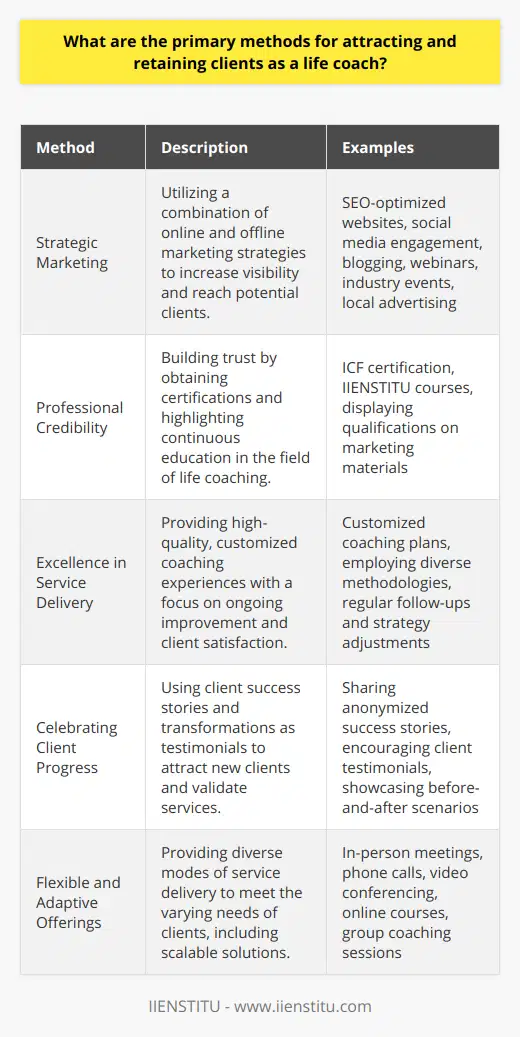
How do I start being a life coach without formal certification?
Establish an Area of Expertise
First, it is vital to identify your area of expertise, which is the subject matter in which you excel and can skillfully coach others. Reflect on your professional experiences, personal journeys, and educational background to pinpoint a specific niche that aligns with your interests and competencies. This will help you provide value to your clients, and it will give them confidence in your abilities.
Gain Practical Experience
After identifying your area of expertise, accumulate practical experience by offering pro bono coaching sessions to friends, family members, or colleagues. These initial encounters will not only refine your coaching skills but also provide you with testimonials and recommendations useful in building your reputation. Moreover, you can expand your network by joining local or online groups focused on your niche and attending relevant seminars or conferences.
Develop Strong Interpersonal Skills
A crucial component of effective life coaching is exceptional interpersonal skills. These include active listening, effective communication, empathy, and the ability to inspire and motivate others. Make a concerted effort to hone these skills through self-directed learning, such as reading books on coaching, participating in online forums, and engaging in role-playing exercises with peers.
Establish a Professional Online Presence
To attract potential clients, use social media platforms and create a professional website showcasing your expertise, services, and testimonials. Share relevant blog posts, podcasts, or videos demonstrating your practical knowledge and experience. Regularly update your online presence with fresh content to maintain engagement and position yourself as an authority in your field.
Invest in Continuous Learning
While formal certification may not be immediately attainable, pursue continuous learning opportunities in order to improve and broaden your coaching skills. This can include online courses, peer coaching exchanges, and mentorship programs. By staying current with best practices and evolving your approach, you can better serve your clients and increase your credibility as a self-taught coach.
Network and Collaborate with Other Coaches
Reaching out to established coaches can help you expand your knowledge and gain insight into industry standards. Consider networking opportunities, such as joining professional associations, attending conferences, or participating in coaching communities. By engaging with other coaches, you can exchange experiences and ideas while building valuable relationships for potential collaborations or referrals.
In conclusion, pursuing a life coaching career without formal certification requires dedication, commitment, and a proactive approach to learning and self-improvement. By following the steps outlined above, you can establish yourself as a knowledgeable and skilled life coach capable of helping others achieve their goals and overcome challenges.
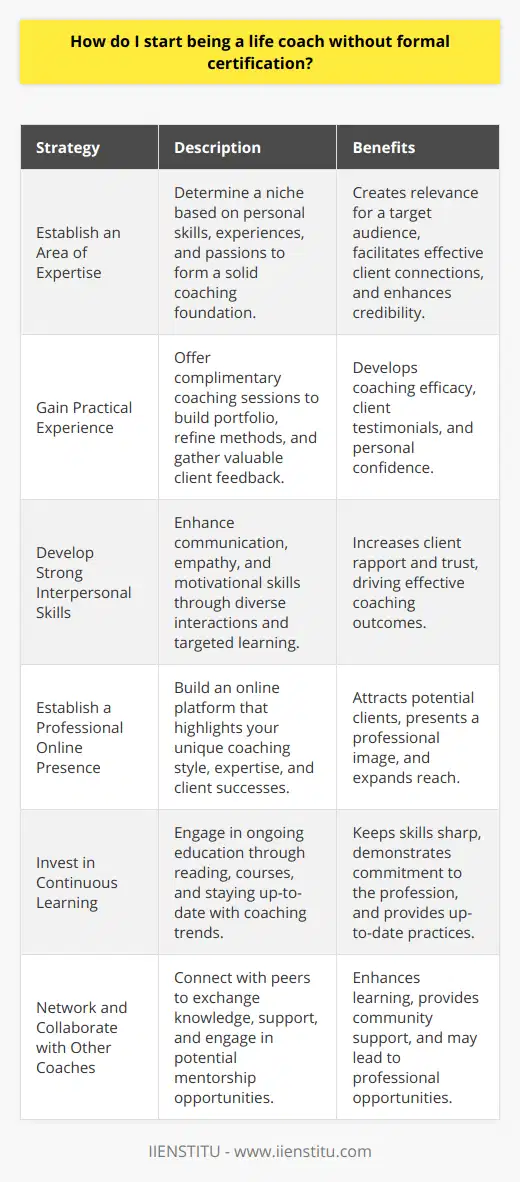
What qualifies you as a life coach?
Qualifications as a Life Coach
Academic Background
A strong foundation for becoming a life coach is having an academic background in psychology, counseling, or a related field. This knowledge equips me to understand the complexities of human behavior, motivation, and decision-making processes. Moreover, obtaining a degree demonstrates a dedication to formal education and a commitment to continuous learning.
Certifications and Training
Acquiring a professional life coaching certification enhances my expertise in the field. I pursued an ICF (International Coach Federation) accredited program, ensuring my training aligns with globally recognized standards. Additionally, it signifies adherence to ethical guidelines and professional conduct, instilling confidence in clients regarding my competence as a life coach.
Industry Experience
Having considerable experience in diverse industries allows me to connect with clients from various backgrounds. This history enables me to comprehend their unique challenges and aspirations, providing tailored coaching sessions specific to their contexts.
Personal Attributes
Possessing essential qualities such as empathy, strong communication skills, and adaptability enables me to effectively guide clients on their growth journeys. Being able to listen actively and offer constructive feedback encourages clients to reflect on their thoughts and actions, facilitating powerful transformations.
Ongoing Professional Development
Lastly, my commitment to ongoing professional development distinguishes me as a life coach. Regularly attending workshops, conferences, and seminars ensures that I stay updated on the latest trends and techniques in coaching. It also enables me to broaden my network and engage in collaborative learning experiences with fellow coaches.
In summary, my qualifications as a life coach come from a combination of an educational background in psychology, professional certification, diverse industry experience, personal attributes, and dedication to lifelong learning. These factors synergistically contribute to my ability to facilitate meaningful change in the lives of those I coach, making me a competent and trusted professional in the field.
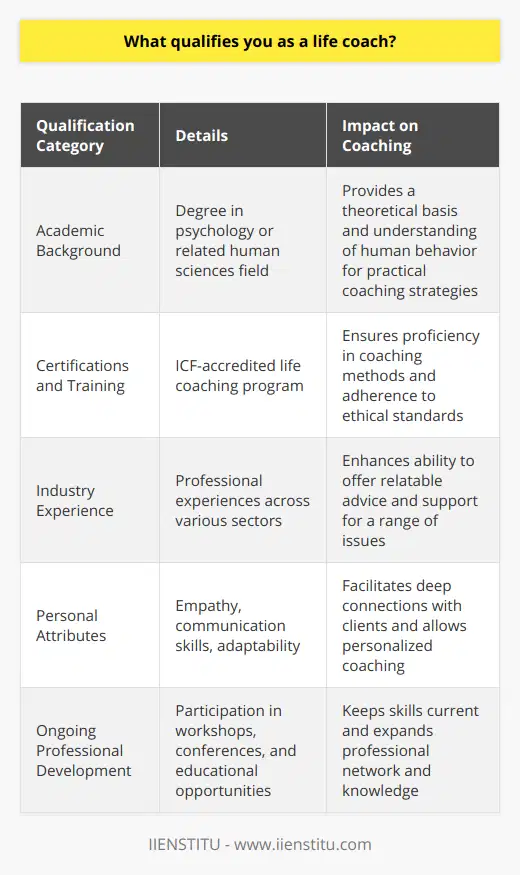
What is needed to be a life coach in Florida?
Licensure and Certification Requirements
To become a life coach in Florida, individuals must first meet the basic requirements of the profession. While there is no specific state license for life coaches in Florida, obtaining a certification from a recognized accrediting body demonstrates professionalism and adherence to industry standards.
International Coach Federation Membership
One notable accrediting organization is the International Coach Federation (ICF), which requires life coaches to complete at least 60 hours of coach-specific training and pass a comprehensive exam. Aspiring life coaches can choose to pursue either the Associate Certified Coach (ACC) or the Professional Certified Coach (PCC) credentials, depending on their level of experience and ambition.
Continual Skill Development
Life coaches in Florida must continuously develop their skills to stay current with industry trends and best practices. This often includes attending workshops, conferences, and seminars specific to the field of coaching. It is also essential for life coaches to network with fellow professionals, both for knowledge exchange and potential client referrals.
Ethical Standards and Code of Conduct
Adhering to a strict code of conduct and ethical standards is integral to being a successful life coach. Practitioners must maintain client confidentiality, avoid conflicts of interest, and display professionalism at all times. Upholding these ethical principles helps to distinguish legitimate life coaches from unscrupulous operators and fosters trust within the coaching relationship.
Business Skills and Marketing
In addition to having the requisite coaching knowledge, life coaches in Florida must possess strong business acumen to succeed in their practice. This includes being well-versed in marketing strategies, client relationship management, and financial planning. A solid business foundation is indispensable to attract and retain clients, ultimately ensuring a prosperous and sustainable coaching practice.
In conclusion, becoming a life coach in Florida requires a commitment to professional development, adherence to ethical standards, and a strong business outlook. Though there is no specific state license for life coaches, obtaining certifications and memberships within professional coaching organizations helps to bolster credibility and success in this rewarding career path.
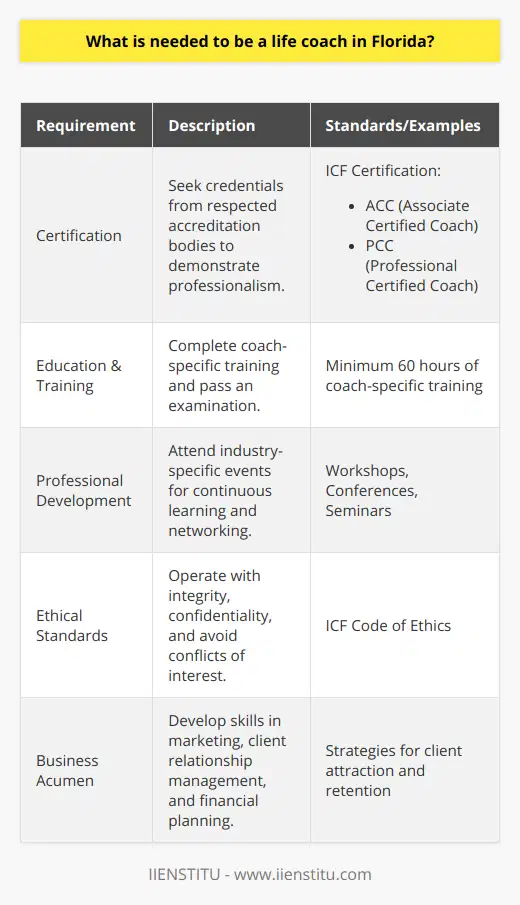
What are the key factors to consider when determining whether it is worth pursuing a life coach certification?
Assessing the Benefits of Certification
When considering the pursuit of a life coach certification, it is essential to analyze several critical factors to determine its worth. These factors include personal and professional goals, market demand for certified coaches, and the investment required.
Establishing Personal and Professional Goals
For starters, identify your personal and professional objectives for obtaining a certification. Are you looking to improve your skills to pursue a career in life coaching, or are you aiming to enhance your overall personal development? Assess how certification aligns with your aspirations and future plans to decide if it is a valuable step for you.
Market Demand and Client Expectations
Understanding the market dynamics and client expectations within the life coaching industry is crucial. Research the demand for certified coaches in your target market and gauge how potential clients view the importance of a certified coach. A high demand for certified coaches may indicate that certification brings credibility, competitive advantage, and increased earning potential.
Investment in Time and Financial Resources
The process of obtaining a life coach certification often demands a significant investment of time and financial resources. Evaluate the cost of recognized certification programs and weigh it against the potential benefits and returns on your investment. Keep in mind that the best certification programs offer comprehensive training and ongoing support, ensuring professional development and increased credibility in the industry.
Considering Accreditation and Program Quality
In addition, consider the reputation and accreditation of the life coach certification program. Evaluate the curriculum, training methods, and teaching faculty to ensure that the program aligns with your learning needs and goals. Accreditation from reputable organizations can also provide further validation of the program's quality.
Continued Professional Development Opportunities
Lastly, examine the opportunities for continued professional development provided by the certification program. A supportive network of peers, resources, and continued education can positively contribute to your growth as a life coach. These opportunities will enable you to refine your coaching techniques, stay updated on industry trends and best practices, and ultimately enhance your portfolio.
In summary, determining whether pursuing a life coach certification is worth it requires considering personal and professional goals, market demand, investment of time and resources, accreditation, and ongoing professional development opportunities. By carefully assessing these factors, one can make an informed decision on the value of obtaining a life coach certification in their career path.
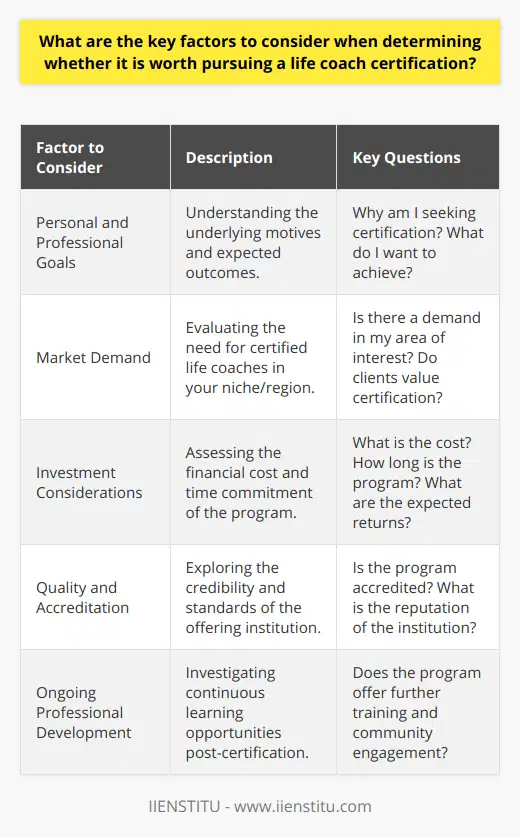
What credentials do you need to be a life coach?
Life Coach Credentials
To become a life coach, it is essential to obtain certain credentials to demonstrate proficiency and expertise in the field. While there are no specific legal requirements, obtaining relevant credentials not only enhances one's credibility but also increases the likelihood of attracting clients.
Professional Certification
The primary credential to consider is a professional certification from a recognized institution. The International Coach Federation (ICF) is a leading global organization that offers reputable accreditation programs for life coaches. Several other organizations also provide comprehensive training and certification in areas such as wellness, relationship, and career coaching.
Educational Qualifications
It is beneficial to have a solid educational background in psychology, counseling, or social work when entering the life coaching profession. A bachelor's or master's degree in any of these fields can provide a strong foundation in understanding human behavior, communication, and motivation, crucial elements in life coaching.
Specialized Training
Life coaches often choose to specialize in a particular niche, such as health, finance, or personal development. Acquiring specialized training in one's chosen area can provide advanced knowledge and skills necessary to address clients' specific needs effectively. This can include workshops, seminars, or online courses tailored to the chosen specialization.
Continuing Education
As the field of life coaching evolves, attending seminars and workshops to stay updated on the latest trends, theories, and techniques is an essential aspect of maintaining a high level of expertise in coaching. Continuous learning ensures that one remains relevant and effective in addressing clients' changing needs and expectations.
In conclusion, obtaining professional certification, relevant education, specialized training, and staying engaged in continuing education are essential credentials for becoming a successful life coach. These credentials help build credibility, enhance expertise, and enable life coaches to effectively assist clients in achieving their personal and professional goals.
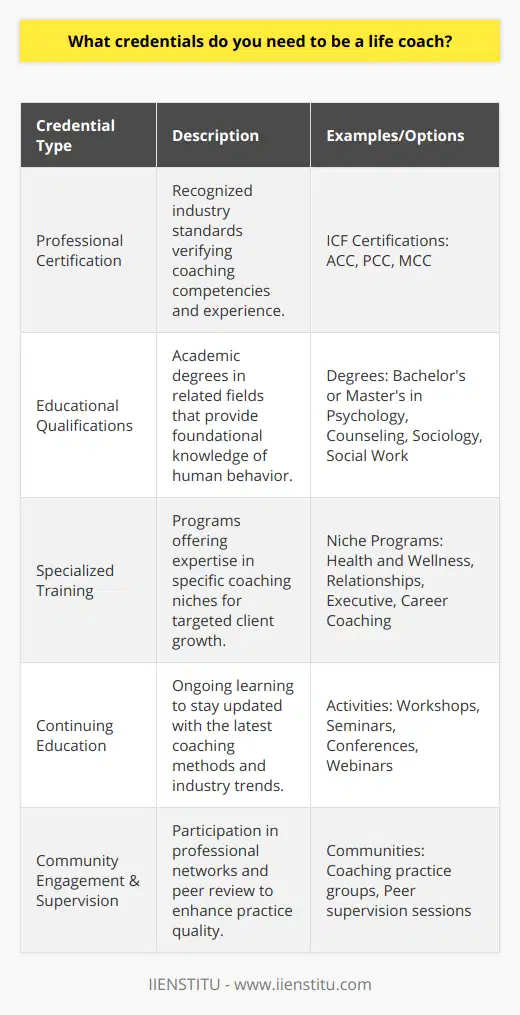
Do I need a license to be a life coach in NY?
Licensing Requirements in New York
In the state of New York, there is currently no specific licensing requirement for individuals wishing to practice as a life coach. This professional field remains largely unregulated, allowing for individuals to offer their services without obtaining a formal license or certification through the state government.
Certification as a Marker of Credibility
Though a license is not required, pursuing a certification from a recognized coaching organization can be beneficial for both the life coach and their clients. Such certifications demonstrate a commitment to professional development, adherence to ethical standards, and the possession of relevant skills and knowledge. Many clients may seek out certified life coaches as a measure of credibility and assurance of quality in the services they offer.
Voluntary Certifications Available
Life coaches interested in pursuing certification may consider organizations such as the International Coach Federation (ICF) or the Center for Credentialing & Education (CCE). These institutions offer various levels of certification, dependent on factors such as coaching experience and the completion of specific training programs. Acquiring these voluntary certifications can enhance a life coach's reputation and potentially attract more clients.
Continuing Education and Skills Development
Life coaches should also invest in their personal growth and skills development, regardless of their certification status. This can include attending relevant workshops, conferences, and training programs. By staying up-to-date on industry trends and best practices, life coaches can ensure that they provide the highest level of service possible to their clients.
In conclusion, while a license is not required for individuals to practice as a life coach in New York, pursuing certification and continuing education remains essential for success in the field. The absence of licensing regulation means that aspiring life coaches must take responsibility for their own professional development and acquiring credentials that demonstrate their expertise and adherence to industry standards.
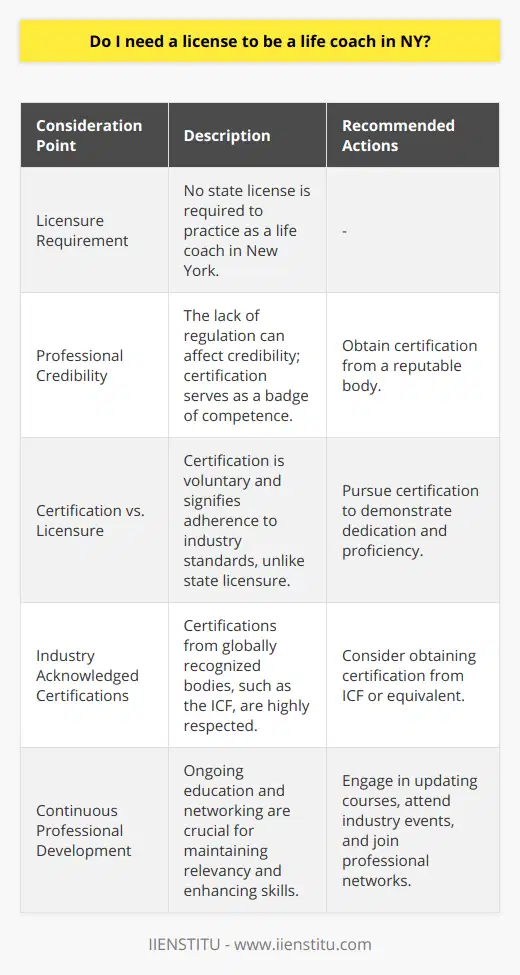
Do you need a license to be a life coach in PA?
Licensing Requirements in Pennsylvania
While life coaching has grown in popularity as a profession, it is important to clarify the licensing requirements in Pennsylvania. Unlike licensed mental health professionals, life coaches may operate without any formal licensure within the state of Pennsylvania. This affects their practice, services, and legal protections.
Differentiation from Mental Health Professionals
To understand this lack of licensure, it is crucial to note the distinctions between life coaches and mental health professionals. Life coaches provide support, motivation, and guidance to their clients in achieving personal goals, but they do not offer mental health services or diagnose psychological issues. In contrast, mental health professionals like psychologists, therapists, or counselors hold licenses that allow them to provide treatment for mental health concerns. Since life coaches do not fall under the same category, they do not require professional licenses.
Professional Associations and Certification Programs
Though licensure is not mandatory in Pennsylvania, aspiring life coaches may seek out alternative accreditation options. Many opt to join professional associations like the International Coach Federation (ICF), which offers a range of certification programs. Becoming certified through such an organization can provide credibility and recognition within the industry, making it a valuable asset for life coaches.
Continuous Education and Skill Development
Although licensure is not required, life coaches should prioritize their own continuous education and skill development to remain relevant and effective. Attending workshops, conferences, and online courses can help enhance their knowledge and skills. Additionally, they should consider partnering with mentors or other experts within the coaching field to build strong networks and learn from their experiences.
Client Awareness and Precautions
Lastly, it is essential for clients seeking life coaching services in Pennsylvania to be aware of the lack of licensing requirements when selecting a coach. Clients should exercise caution and thoroughly evaluate potential life coaches' qualifications, client testimonials, and any certifications or memberships in professional organizations. This due diligence can help them make informed decisions when choosing the right life coach to guide them towards their goals.
In conclusion, life coaches in Pennsylvania do not need a license to practice. However, pursuing certification and continuous education can contribute to their credibility and effectiveness. Clients should exercise caution and be aware of the differences between life coaches and licensed mental health professionals before selecting a provider.
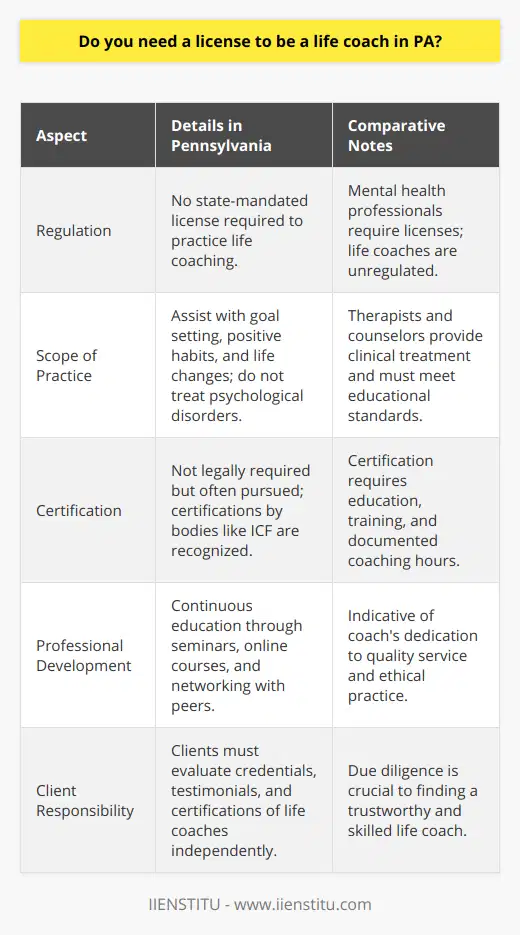
What is the difference between a life coach and a therapist?
Function and Focus of the Two Roles
The significant differentiation between a life coach and a therapist lies in their function and focus in a client's life. Therapists focus on past traumas and issues to improve a client's present situation. They diagnose and treat specific psychological disorders, utilizing various therapeutic models and techniques. Life coaches, however, concentrate on a client's present life and future aspirations.
Role of Life Coaches
Life coaches utilize a future-focused methodology to empower individuals, inspire change, and drive personal and professional success. They do not diagnose or treat mental illnesses. Instead, life coaches act as a motivational guide, offering the essential tools and strategic planning required to reach previously established life or career goals.
Approach of Therapists
On contrast, therapists help their clients to cope with and heal from mental and emotional distress. They research deeper psychological issues and are qualified to diagnose and treat mental health problems. Therapy deals significantly with a client's history and seeks to repair emotional wounds to foster personal growth and improved mental health.
Nature of Relationships
The client-professional relationship also varies between life coaching and therapy. In therapy, the relationship tends to be longer-term and more in-depth to facilitate recovery from mental health issues. Conversely, the life coaching relationship might be shorter-term and more task-oriented, focused explicitly on achieving certain life goals.
In conclusion, both life coaches and therapists work towards enhancing an individual's quality of life. However, they do it in different ways and with a distinct focus.
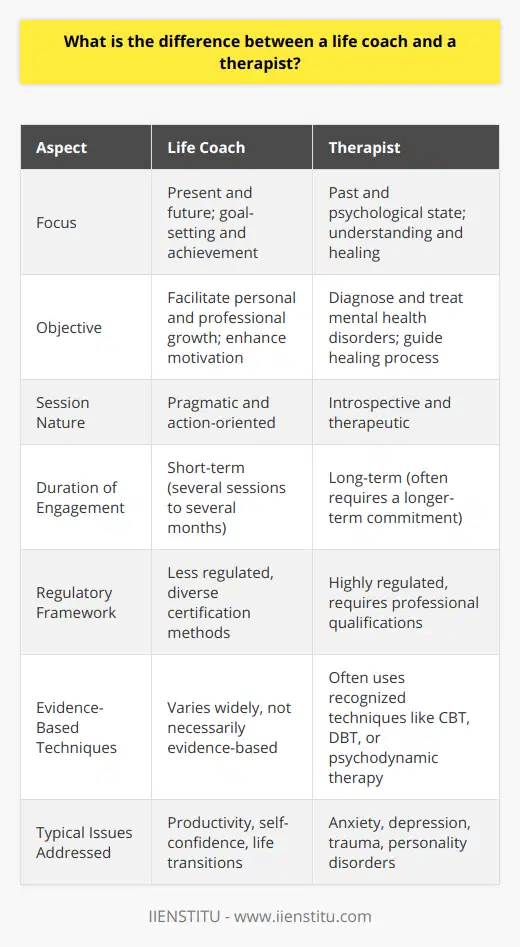
What do you need to be a life coach in Washington state?
Understanding Life Coach Requirements
The State of Washington does not require special licensure to work as a life coach. However, gaining certification and education in the field can significantly increase credibility and clients' confidence.
Education and Certification
A bachelor's degree in counselling or psychology provides a strong foundation. However, degrees in business or health can also prove beneficial. For certification, the International Coach Federation (ICF) offers globally recognized programs. These increase your skills and make you more marketable to clients.
Experience and Skills
Previous experience, whether in counselling, business, teaching, or nursing provides a solid background. This experience transfers valuable skills to coaching. Essential skills for this profession include active listening, effective communication, problem-solving, and goal-setting abilities.
Ethics and Regulations
Coaches should understand and adhere to the ICF Code of Ethics. This code provides a framework for professional conduct and shapes coaching relationships. Furthermore, adhering to all applicable business regulations is a must for any prospective coach.
Business Planning
Coaches should construct a robust business plan. This provides a roadmap to success and typically includes market research, financial planning, and marketing strategies.
Continued Education
Continuous learning and staying updated on coaching techniques and research helps maintain a competitive edge. Many lifecoaches attend seminars, workshops, or achieve additional certifications to upgrade their skills.
Personal Attributes
Finally, personal characteristics such as empathy, patience, charisma, and an authentic passion for helping others are vital in this field. These intangible qualities build trust, develop powerful alliances and ultimately lead to success.
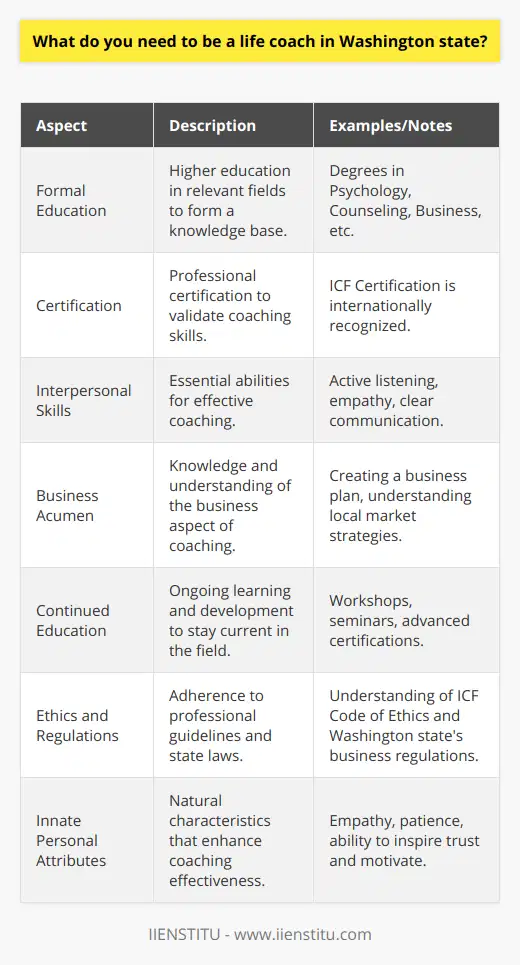
Is the life coach school certification worth it?
Value of Life Coach School Certification
Life Coach School Certification does have considerable value for aspiring life coaches. First, the certification provides a formal, structured training. It helps in acquiring essential interpersonal skills, effective communication techniques and applicable coaching methodologies.
Role of Recognized Certification
Certifications from recognized, reputable life coach schools provide credibility and enhance marketability. Clients often seek professionals with a certain level of qualification, seeing the certification as proof of competence and expertise. This certification can help life coaches attract more clients and expand their practice.
Professional Enhancement
The certification program helps in professional enhancement, by promoting continuous learning and personal growth. It provides experiences that broaden perspective, deepen understanding, and shape coaching style, which are invaluable in the ever-changing dynamics of life coaching.
Networking Opportunities
Life coach school certification also acts as a gateway to networking opportunities. This gain access to a community of like-minded individuals, who can offer support, advice, and potential collaborative opportunities.
Ethical Standards
Lastly, undertaking a certification ensures adherence to ethical standards. Clients trust that a certified coach will undertake his/her responsibilities professionally and ethically.
In summary, considering the benefits such as structured training, credibility, enhanced marketability, continuous professional growth, networking opportunities, and ethical responsibility, the life coach school certification is worth the investment. However, it is crucial to enrol in a recognized and accredited institution to ensure the certification’s value.
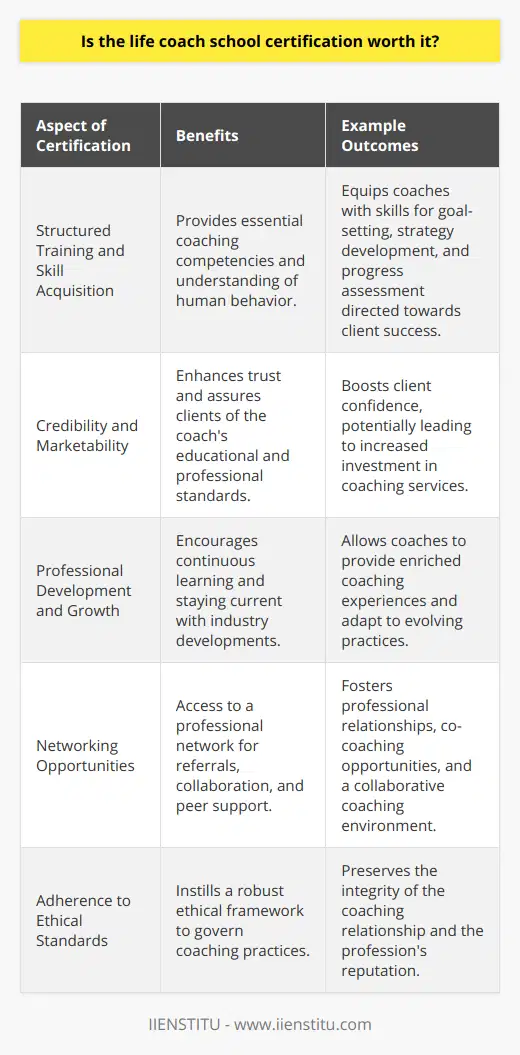
What does a life coach do exactly?
Role Definition
A life coach provides guidance to people seeking to make significant changes or improvements in their lives. They offer constructive support to help their clients overcome challenges, make informed decisions, and achieve personal goals.
Tasks of a Life Coach
They often work with clients to develop tangible strategies for growth and advancement. This can involve setting goals, planning action steps, and designing methods of monitoring progress. They help people find the direction and focus they need to flourish.
Facilitating Self-Awareness
A life coach encourages individuals to look inward and develop a deeper understanding of themselves. They stimulate introspection, helping clients identify their strengths, weaknesses, values, and motivations.
Instigating Action
A life coach does more than just assist with goal-setting. They also spur their clients into action, nudging them towards their desired future. They offer ongoing feedback and encouragement, whilst holding the client accountable for their progress.
Improving Relationships
Many life coaches aid clients in improving their relationships. They provide tools for better communication, conflict resolution, and understanding the perspectives of others.
Resolving Life Transitions
During challenging life transitions like a career change, the loss of a loved one, or a major move, a coach can provide necessary support. They provide a non-judgmental space for clients to express their feelings, manage stress, and cope with the changes.
In sum, a life coach serves as a facilitator of change and development. They use various skills in communication, problem-solving, and behavioral techniques to support their clients in achieving their personal objectives.
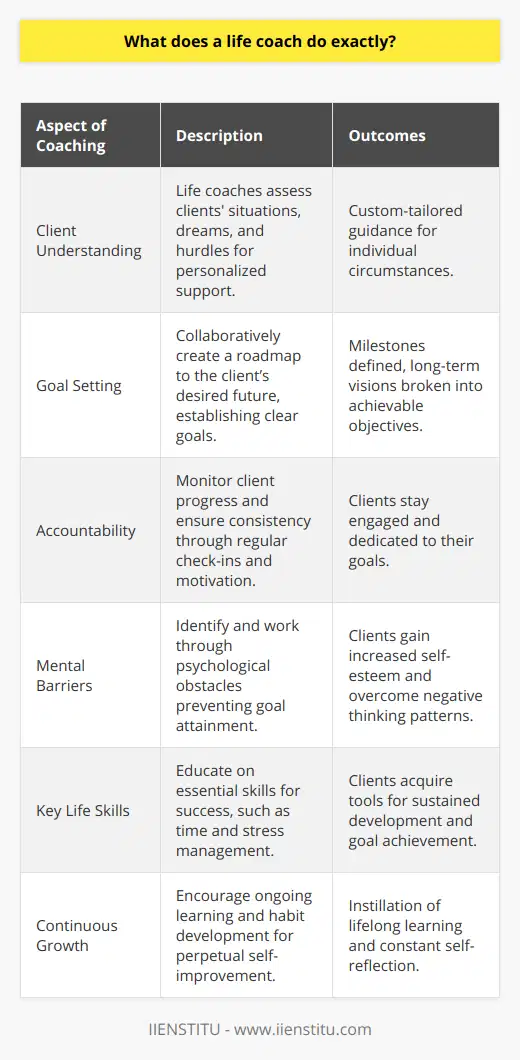
What credentials do you need to be a life coach?
Education and Training
A life coach does not need specific credentials in terms of higher education. Those interested often come from diverse educational backgrounds. Nevertheless, it is common to have a background in psychology, counselling, or a related field.
Certification Programs
A key in becoming a life coach is to undergo a certification program accredited by the International Coach Federation (ICF). Certification programs often involve various levels of coaching training and practice hours. A noteworthy fact is that the ICF only recognizes programs that maintain a certain set of standards.
Specialized Skills
Candidates must have excellent communication skills and an inherent desire to help others. They also need to acquire the ability to listen actively, suggest solutions, motivate their clients, and convey empathy and understanding.
Real-life Experience
In addition to formal qualifications, real-life experiences can sometimes be the most crucial component. People often seek life coaches who have faced and overcome the same problems they are struggling with.
Above all, a life coach must be patient, trustworthy, supportive, and able to positively influence others. These personal traits, in combination with proper training, results in a successful life coach.
Professional Development
Indeed, once a life coach, also an ongoing professional development is essential to keep skills and knowledge updated. This can be achieved through additional courses, workshops and reading up on the latest theories and research.
In conclusion, though there are no strict educational prerequisites for becoming a life coach, proper training, special skills, personal characteristics, and real-life experiences play significant roles. It is highly recommended to seek certification from reputed institutions such as the ICF to enhance credibility and professionalism.

What is the difference between a life coach and a therapist?
Understanding the Roles
A life coach and a therapist play distinct roles in fostering personal growth and well-being. To differentiate between these professions, one must look closely at their objectives, process and training.
Set Goal Versus Healing
Life coaches focus primarily on the future. They help clients clearly define their personal and professional goals, and develop an actionable plan to achieve these goals. Conversely, therapists focus more on healing from past traumas or psychological issues.
Nature of Relationship
The relationship between a life coach and client can be more collaborative and equal. The coach serves as a guide, providing support and accountability as the client works towards their goals. On the other hand, a therapist maintains a professional stance, leveraging their specialized training to diagnose and treat mental health issues.
Process and Tools
Life coaches employ practical tools and methods, including goal-setting exercises and accountability check-ins. On the contrary, therapists utilize a variety of therapeutic techniques, such as cognitive behavioral therapy or psychodynamic therapy, depending upon the individuals' needs.
Education and Training
The training required for these professions also differs significantly. Life coaches often complete certification programs and follow ethical guidelines set by organizations like the International Coach Federation. Therapists, however, are licensed professionals, with a minimum of a Master’s degree in psychology or a related field, and required to meet ongoing education and ethical standards.
In summary, while both life coaches and therapists aim to improve the quality of an individual's life, they operate from different perspectives and employ varied methods. Both serve a vital role in supporting overall wellness and personal growth, and choosing between them depends on an individual's unique needs and circumstances.

